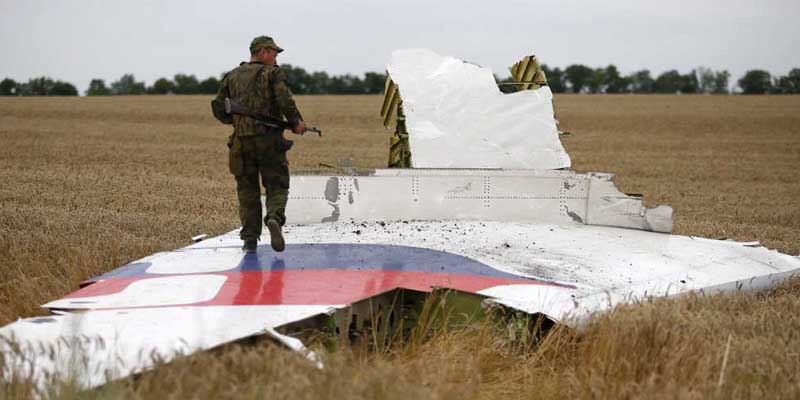The Dutch prosecution on Wednesday called for life imprisonment for the four suspects in the downing of Malaysia Airlines Flight MH17 in eastern Ukraine in 2014, a “long prison sentence” demanded after half a hundred court sessions in the Netherlands to try three Russians and a Ukrainian in absentia.
The prosecution held them “fully responsible” and “guilty” of the “murder” of the 298 passengers, 192 of whom were Dutch, a crime that “has caused an international commotion that still continues”, so “must” be sought for their arrest so that they can serve the sentence that is finally handed down.
→ They discover that flight MH370 went into a holding pattern for 22 minutes.
Russian citizen Oleg Pulatov is the only accused who acknowledged this judicial process by sending a team of lawyers to defend him before the high security court of Schiphol Amsterdam, although he did not attend the court, EFE reported.
The other two Russians – Igor “Strelkov” Girkin and Sergey Dubinsky – and the Ukrainian – Leonid Kharchenko – are unaccounted for.
The plane departed on July 17, 2014 from Amsterdam bound for Kuala Lampur and was shot down while flying over eastern Ukraine.
The four are believed to be responsible for organizing the installation of the missile launcher, its deployment, and its transportation to and from Russia, and, although they occupied different positions, they worked closely together for the downing. “We reproach the suspects for not providing any explanation and attempting to conceal the facts,” the prosecutor’s office said.
→ Stowaway survives Guatemala-Miami flight hidden in plane’s landing gear.
The evidence includes intercepted telephone conversations, witness statements, photos and videos of the missile transport, as well as a thorough investigation of the wreckage of the aircraft and an analysis of the evidence by an international team.
Prosecutor Thijs Berger listed the psychological impact of the tragedy on family members, which he grouped into “mental and physical complications” (post-traumatic stress syndrome, insomnia, lack of appetite, among others), “work problems” (some lost the person who supported the family financially) and “relationship problems” with partners and family members.
“I have lost all purpose in life” and “I live with depression, anxiety and was formally diagnosed with post-traumatic disorder syndrome, but no medication helps,” were two statements from relatives that Berger listed to point out that “for relatives there is a before and after MH17.”
It stressed that the defendants used “devastating violence” that was “planned and organized in advance” and this crime is of such a “grave and serious nature, that it must be punished with a harsh sentence,” regardless of whether or not the defendants “intended the devastating consequences of intentionally shooting down the plane.”
It is believed that the shooting down of the civilian plane was a “mistake”, since the suspects believed they had hit a fighter plane, but – the prosecution understands – “they should have assumed that they could hit a civilian flight”, since the airspace was not closed to commercial aviation.
Moreover, “crimes against aviation are so serious that they alone justify a very long prison sentence,” he added.
Nor did he consider it a “reducing element” of the sentence that the shoot-down occurred in the midst of armed conflict between the Ukrainian military and pro-Russian separatists, because “from a legal point of view, they were ordinary citizens,” Berger said.
“War is not a license to kill” and “the defendants also did not have permission to participate in the war in eastern Ukraine,” the prosecutor added, based on a United Nations report.
Moscow – accused by the Dutch government of being behind the shoot-down – always rejected any link to what happened and also does not recognize this judicial process, so it did not want to facilitate the extradition of the defendants, who are believed to be in Russia.
Berger also stressed that the suspects “cannot hide behind others involved” in the tragedy either, since the four “had their own responsibility” to prevent the tragedy and “have had the opportunity to back out, but have chosen to go ahead with the plan”.
Berger recalled the “stress” suffered by the families and those involved in the recovery of the remains, since there were “coffins with incomplete bodies,” others “two bodies were never located” and, for example, only a two-centimeter piece of bone was recovered from the body of a man “two meters” tall.
“Punishing a crime is a moral imperative, but also an international treaty obligation,” concluded Berger. This trial, which had for now 49 sessions, started in March 2019 and will resume next March 7 with the arguments of the Defense.
The final judgment is expected by the end of 2022.
By Imane Rachidi
Related Topics
Embraer and Adani Defence & Aerospace Elevate Alliance: Agreement for an E175 Final Assembly Line in India
Lufthansa Group and Air India Sign MoU for Joint Business Agreement Following EU-India Free Trade Deal
Air India Fined $110,350 for Operating Airbus A320 Without Valid Airworthiness Certificate
AirAsia X Launches Kuala Lumpur-Bahrain-London Route, Establishing Bahrain as Its First Strategic Hub Outside Asia
Plataforma Informativa de Aviación Comercial con 13 años de trayectoria.
